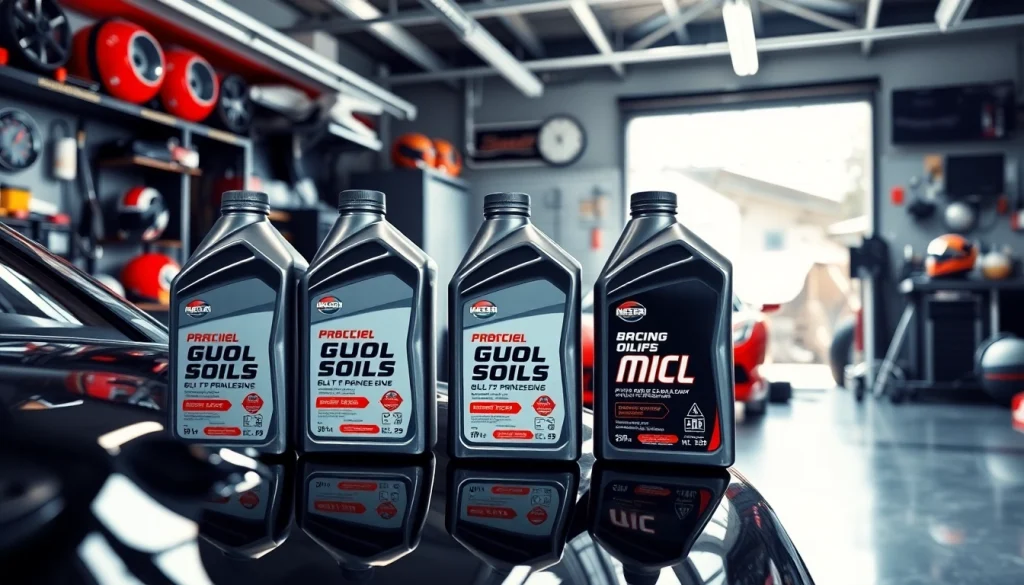Understanding Racing Engine Oils
When it comes to the world of high-performance vehicles, the significance of using the right engine oil cannot be overstated. Racing engine oils are specially formulated to meet the unique demands of racing applications, offering superior protection and performance compared to standard automotive oils. This article delves deep into the characteristics, types, and future of these essential fluids, making sure you have the knowledge to choose the most appropriate oil for your racing needs.
What Makes Racing Engine Oils Unique?
Racing engine oils are designed for extreme conditions encountered in competitive racing. Their formulations typically feature advanced synthetic base stocks and a highly specialized additive package. These oils focus on high shear stability, exceptional thermal resistance, and superior lubrication qualities, ensuring they perform optimally even at high RPMs and extreme temperatures.
Key Benefits of Using Racing Engine Oils
The benefits of using racing engine oils include:
- Superior Wear Protection: Racing oils provide enhanced protection against wear and tear under high-stress conditions, significantly prolonging the engine’s lifespan.
- Enhanced Thermal Stability: These oils retain their viscosity and provide consistent performance at elevated temperatures, essential for racing environments.
- Increased Horsepower: Racing engine oils can reduce friction losses, allowing for improved horsepower and overall performance during races.
- Maximum Oil Flow: High-performance oils are engineered to flow rapidly, providing essential lubrication to crucial engine parts without delay.
Common Misconceptions about Racing Engine Oils
Despite their benefits, there are several misconceptions about racing engine oils, such as:
- They are only for race cars: While primarily designed for competitive settings, many racing oils can also enhance performance in standard high-performance vehicles.
- They are unnecessary for casual drivers: Casual drivers may still benefit from the protective qualities and performance enhancements provided by racing oils, especially in demanding driving conditions.
- All racing oils are the same: Different racing oils are tailored for specific applications and conditions, making selection crucial.
Types of Racing Engine Oils
As with many automotive products, racing engine oils come in various types, each serving different needs. Understanding these differences is essential for selecting the right oil for your racing engine.
Synthetic vs. Conventional Racing Engine Oils
Racing engine oils predominantly fall into two categories: synthetic and conventional. Synthetic oils are engineered from chemically modified materials, providing superior performance and resistance to degradation. On the other hand, conventional oils are derived from crude oil and may not offer the same level of protection and performance enhancement.
Choosing between synthetic and conventional oils often depends on the specific demands of the racing environment, with synthetic oils generally being preferred due to their performance benefits.
Choosing the Right Viscosity for Your Engine
The viscosity of an engine oil is a critical factor influencing engine performance and protection. Racing oils are available in various viscosities, allowing racers to select the right oil based on their engine specifications and the operating temperature range. The Society of Automotive Engineers (SAE) provides a viscosity grading system, indicating how well the oil will perform under different temperature conditions.
Performance Enhancements with Specialty Oils
Some racing oils are compounded with specialty additives tailored for specific performance enhancements, such as improved friction modifiers, detergents, and anti-wear agents. These additives can further enhance thermal stability, reduce deposits, and improve overall performance, offering targeted improvements based on racing conditions.
How to Choose Racing Engine Oils for Your Vehicle
Selecting the right racing engine oil requires careful consideration of various factors including engine specifications, oil specifications, and performance expectations. Here’s a guide to help you make an informed choice.
Assessing Engine Specifications and Requirements
Before selecting an oil, examine your engine specifications, including the manufacturer’s recommendations for viscosity and oil type. Also, consider aspects such as engine modifications, the type of racing you plan to engage in, and the typical ambient temperatures during races.
Evaluating Oil Additives and Their Roles
Understanding the role of additives in racing engine oils can help in selecting the right oil. Additives can help reduce friction, control oxidation, improve detergency, and provide anti-wear benefits. Look for oils that contain well-balanced additive packages that align with your specific racing needs.
Expert Recommendations for Racing Oil Brands
Numerous brands offer racing engine oils, with notable names including Mobil 1, Red Line, Royal Purple, and Castrol. Consulting with experienced performance mechanics and researching user reviews can aid in identifying the best products tailored for your engine’s requirements.
Common Issues with Racing Engine Oils
Even the best racing engine oils can encounter issues, demonstrable in degradation, consumption, or storage mishaps. Recognizing these problems early can save engines from severe damage.
Identifying Signs of Oil Degradation
Oil degradation can manifest in various ways, including increased viscosity, discoloration, and the presence of particulates. Monitoring the oil’s appearance and performance can help in identifying degradation early, allowing for timely oil changes.
Understanding Oil Consumption and Its Impacts
High oil consumption can be detrimental to engine performance, often indicative of underlying issues such as leaks, poor sealing, or excessive engine wear. Regularly monitoring oil levels and conducting checks can help detect these issues, ensuring performance remains optimal.
Correcting Common Oil Problems in Racing Engines
Common problems such as overheating, sludge buildup, and foaming can significantly impair oil performance. These issues can generally be resolved through monitoring engine temperatures, utilizing proper oil filtration systems, and following the manufacturer’s maintenance recommendations carefully.
The Future of Racing Engine Oils
As automotive technology progresses, so does the development of racing engine oils. staying informed about advancements can help racers select the most effective products for their engines.
Emerging Technologies in Engine Oil Development
Technological advancements in oil formulation, such as molecular-level modifications and the use of nanotechnology, are changing the landscape of racing engine oils. These innovations aim to provide greater engine protection, improved friction reduction, and enhanced thermal stability.
Sustainability Trends in Racing Oils
With increasing focus on sustainability, some manufacturers are beginning to offer racing oils derived from renewable resources, designed to produce less environmental impact while maintaining high-performance standards. These oils aim to meet the environmental regulations while not compromising on performance.
Predictions for Performance Enhancements in Racing Engines
The future holds great promise for further enhancements in engine oils. Innovations such as fully biodegradable lubricants or those that utilize AI for personalized performance can redefine how racing oils are formulated and used, leading to unprecedented levels of engine efficiency and longevity.







